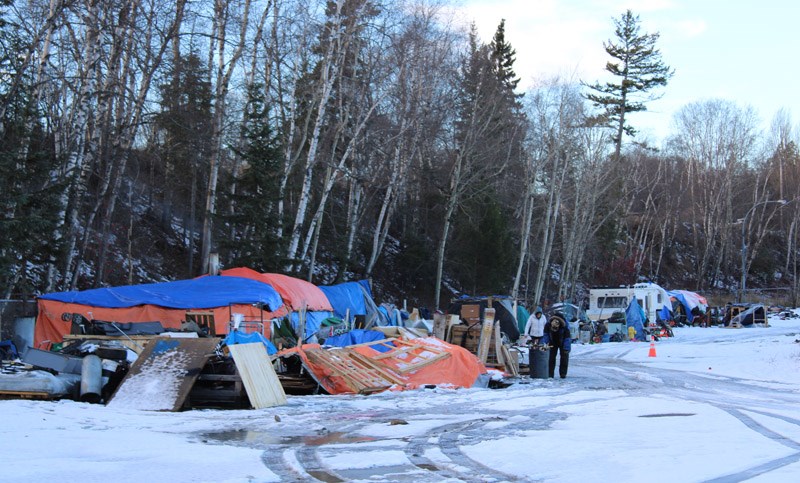A B.C. Supreme Court Justice has dismissed the City of Prince George’s application to close down Moccasin Flats.
In a 27-page decision issued Wednesday, Simon Coval denied the city's interlocutory injunction to remove the last residents of the tent encampment near downtown Prince George, commonly known as Moccasin Flats or Lower Patricia.
By demolishing much of the encampment on Nov. 17, 2021, Coval stated the city was in breach of Justice Christopher Hinkson’s October 2021 ruling which allowed the Lower Patricia encampment to remain open until suitable housing and daytime facilities were available.
The city argued that it had satisfied conditions of Hinkson's ruling by providing suitable housing and daytime facilities with the opening of the Knights Inn, leased for this purpose by BC Housing, but Coval ultimately rejected the city’s position.
“I find that, before dismantling and demolishing much of the encampment on November 17, 2021, the City failed in the admittedly difficult task of identifying, as much as reasonably possible, how many people were regularly occupying the camp and how their shelters and belongings should be managed.”
Coval also accepted evidence from Bell Johnny, a named respondent who lives in Moccasin Flats, that in December 2021 about eight people continued to reside at Lower Patricia, but that many other people had left only because their shelters had been and had dispersed without housing.
The city had said that in December 2021 only two occupants remained at Lower Patricia because they refused alternative housing.
“I find that numerous people residing at Lower Patricia in mid-November 2021 left the camp only because their shelters and belongings were dismantled and destroyed in their absence and they were not offered housing,” Coval said.
Coval said the availability of the units at the Knights Inn are insufficient to house the occupants of Lower Patricia as the city acknowledged that in late December there were no available units though five more would eventually become available after extensive renovations.
“This is insufficient to house the current occupants of Lower Patricia and the former occupants dispersed without housing.”
Coval also accepted the evidence from unhoused residents regarding the shortage of low-barrier shelter space in the city and the difficulty of accessing daytime facilities.
“Particularly in a northern city during winter, is exceedingly difficult given the complex personal circumstances and challenges of the homeless. The difficulties are exacerbated by the COVID-19 pandemic.”
Furthermore, Coval rejected the city’s position that only the number of “current” occupants of Lower Patricia should be considered, not those who were dispersed following the November dismantling.
Coval said it was “unreasonable” to ignore those who were evicted, in breach of the order, without their belongings or any offer of housing.
“I find that some of the Lower Patricia occupants helped to relocate to the Knights Inn lost their personal belongings in the dismantling without reasonable opportunity to collect all that was essential and important to them.”
Coval said that under the previous ruling, the Lower Patricia encampment was permitted to stay unless the city demonstrated available and accessible housing and daytime facilities for its occupants which it failed to do.
Although he acknowledge the encampment is a fluid, complex and difficult situation and is not an acceptable long-term solution for unhoused individuals, Coval said none of this entitled the city to dismantle much of the camp before returning to court to seek an order to do so.
“This breach inflicted serious harm on vulnerable people.”
Coval summarized his decision stating that by not satisfying the conditions of the previous order to close Lower Patricia, the city’s application for an injunction is dismissed with costs.
In a statement, the city says it brought this application to request a temporary injunction to allow the removal of the encampment from City property, as they are unhealthy, and unsafe.
The City said it will "continue to work with BC Housing, and other service providers, on these multijurisdictional issues for the benefit of all Prince George citizens" and "while the City continues to review the judgment, no further comment will be provided."
Coval also noted that the respondents also have the option to seek additional special costs if they choose to pursue it, which are typically awarded when there has been reprehensible conduct on the part of one of the parties in the course of litigation.
In previous submissions to the court, the respondents argued that the city “has engaged in reprehensible conduct throughout the conduct of this litigation. The bulldozing of Lower Patricia on Nov. 17 2021 as described above, was accrued out without the requisite statutory authorization and in flagrant violation of the Hinkson order.”
While the city is also currently appealing the original Hinkson order, the respondents argued the city demonstrated abuse of process by bringing the second injunction application to court to circumvent the appeal process.
“The city’s conduct is sufficiently worthy of rebuke and ought to result in an order for special costs as against the city.”
The city has not provided further comment on this matter.






